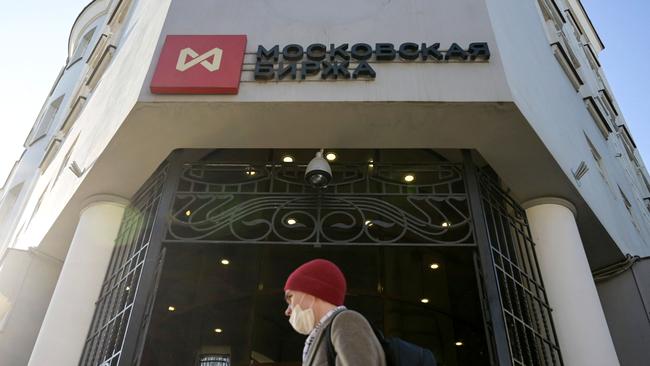Ukraine crisis: Ten things to know
The Russian invasion raises a range of questions for active investors – here are the key issues to date.

Business
Don't miss out on the headlines from Business. Followed categories will be added to My News.
Why are markets not falling?
Sharemarkets in the US and Australia had already experienced a correction – a drop of 10 per cent – before the crisis developed. Nevertheless, strong corporate results around the world along with rebounding GDP expectations have put a floor under markets. This may change, but in these key early weeks of the war, sharemarkets have not dropped dramatically because convincing fundamentals – including rising commodity prices – are supporting share prices.
How important is Ukraine economically?
Despite the scale of the human tragedy unfolding, the Ukrainian economy is not significant. It represents 0.14 per cent of global GDP, which is less than a 10th the size of Australia’s. But it is an important exporter of soft commodities, especially wheat and food oils. Economically, the key threat of the current crisis is that Russia could ultimately bolster its position as a commodity power, adding Ukraine’s soft commodities to its energy portfolio. Russia is the second-biggest exporter of oil in the world after Saudi Arabia.
What is the biggest investment risk here?
The immediate risk is that the Russian market is now “uninvestable”. Investors are set to be hit with losses as investments cannot be sold – the Russian sharemarket is closed. The ultimate risk is contagion: the Ukrainian crisis could destabilise credit markets. A key factor could be Russia defaulting on its sovereign bonds, which have been classified as junk by ratings agencies. This week The Wall Street Journal reported that payments on rouble bonds were running late, “creating the conditions for Russia’s first potential default in over two decades”.
Why won’t the West put sanctions on Russian oil and gas?
Europe is already struggling with high oil and gas prices and Russia is a key supplier into the market. Yet, unless such sanctions are introduced, the impact of existing sanction activity – such as companies closing stores in Russia – can only be partial: Russia is making an estimated $US700m a day on oil exports.
Why are Australian super funds selling Russian shares?
The big funds are under pressure from Josh Frydenberg to quit Russian assets – the impact of any such moves will be largely symbolic since Russian investments are relatively small in the context of our $3.5 trillion super sector.
Is the crisis inflationary?
Yes – on balance. There is evidence that sky-high energy prices in Europe could crimp consumer spending, which could be deflationary. But overall higher energy prices around the world will stoke inflation, which is already at its highest level for decades.
What does it mean for interest rates?
Global interest rate rises could now be slower than originally anticipated. The US announced it would raise its key rate 0.25 per cent this week, but the comments from the US Federal Reserve indicated the pace of rate rises could be more restrained due to the potential brake on global growth from the crisis.
In Australia, higher rates would accelerate existing trends, including a looming slowdown in the residential property market.
What does it mean for ASX sharemarket investors?
In the short term, the resources-heavy Australian sharemarket may actually prosper. Oil, coal and a range of commodity prices are soaring. BHP alone is 10 per cent of our market capitalisation. But in the longer term, any decline in globalisation will be a negative for Australia’s economy.
For international investors, the most common direct exposure to Russia is though emerging market funds, which typically might have a 3 per cent exposure to Russia. This week the key player in market indices, the Morgan Stanley Capital International index, said it would cut Russian shares from its benchmark.
How do ethical investors respond?
A respected fund manager, Koda Capital, was hit with a financial equivalent of being “cancelled” this week when it issued a note on bargains in Russian markets. The fund later withdrew the note. But investors must take a position in a crisis where global markets are changing quickly. Many big funds led by environmental social governance (ESG) rules have done well in recent years, but they will now pay a price for avoiding fossil fuels since oil has shot to $US110 a barrel and coal has doubled to test $US400 a tonne.
Is there an investment upside?
Russia’s economy is now substantially shut off from the world while Russian civilians struggle with a falling currency. The potential upside – still rated as a low probability – is that the crisis results in the fall of the Putin regime. In turn, that reopens Russia – which has huge economic potential – for international investors.
Separately, history suggests regional wars do not cause long-term investment losses.
As a note from the Clearbridge group examining Wall Street share prices during wartime suggests: “Once the lows have been made, shares have done nicely, delivering 6.5 per cent in the first three months from the lows and 13 per cent over the first year. Interestingly, in looking at the last five major wars (Vietnam, Gulf War, Afghanistan, Iraq and Crimea) the market actually bottomed prior to the invasion occurring. The initial equity market response does not appear to be out of line with historical patterns.”
Originally published as Ukraine crisis: Ten things to know



